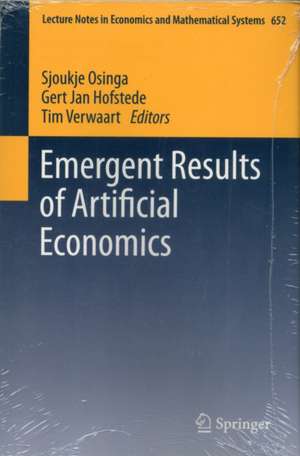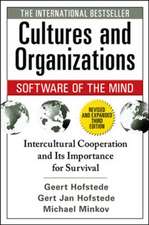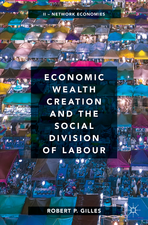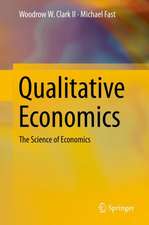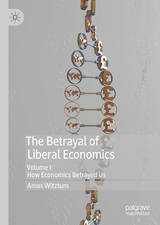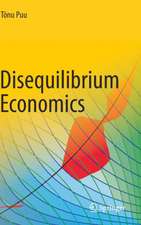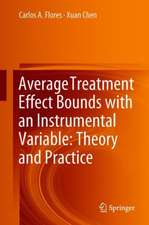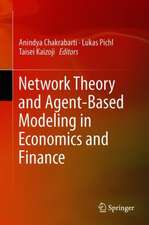Emergent Results of Artificial Economics: Lecture Notes in Economics and Mathematical Systems, cartea 652
Editat de Sjoukje Osinga, Gert Jan Hofstede, Tim Verwaarten Limba Engleză Paperback – 24 iun 2011
Din seria Lecture Notes in Economics and Mathematical Systems
-
 Preț: 360.02 lei
Preț: 360.02 lei -
 Preț: 383.93 lei
Preț: 383.93 lei - 15%
 Preț: 693.39 lei
Preț: 693.39 lei -
 Preț: 384.09 lei
Preț: 384.09 lei -
 Preț: 380.07 lei
Preț: 380.07 lei -
 Preț: 446.26 lei
Preț: 446.26 lei -
 Preț: 497.37 lei
Preț: 497.37 lei -
 Preț: 380.84 lei
Preț: 380.84 lei -
 Preț: 384.86 lei
Preț: 384.86 lei -
 Preț: 378.34 lei
Preț: 378.34 lei -
 Preț: 399.67 lei
Preț: 399.67 lei - 20%
 Preț: 360.93 lei
Preț: 360.93 lei - 15%
 Preț: 643.16 lei
Preț: 643.16 lei -
 Preț: 379.09 lei
Preț: 379.09 lei -
 Preț: 404.76 lei
Preț: 404.76 lei -
 Preț: 385.62 lei
Preț: 385.62 lei - 15%
 Preț: 644.49 lei
Preț: 644.49 lei -
 Preț: 379.09 lei
Preț: 379.09 lei -
 Preț: 345.50 lei
Preț: 345.50 lei -
 Preț: 425.80 lei
Preț: 425.80 lei -
 Preț: 378.34 lei
Preț: 378.34 lei - 18%
 Preț: 775.65 lei
Preț: 775.65 lei -
 Preț: 392.60 lei
Preț: 392.60 lei -
 Preț: 401.61 lei
Preț: 401.61 lei - 15%
 Preț: 646.43 lei
Preț: 646.43 lei -
 Preț: 382.18 lei
Preț: 382.18 lei -
 Preț: 378.34 lei
Preț: 378.34 lei - 15%
 Preț: 637.59 lei
Preț: 637.59 lei - 15%
 Preț: 647.27 lei
Preț: 647.27 lei -
 Preț: 377.73 lei
Preț: 377.73 lei -
 Preț: 447.84 lei
Preț: 447.84 lei - 15%
 Preț: 644.49 lei
Preț: 644.49 lei -
 Preț: 386.00 lei
Preț: 386.00 lei - 15%
 Preț: 654.43 lei
Preț: 654.43 lei -
 Preț: 415.02 lei
Preț: 415.02 lei -
 Preț: 411.54 lei
Preț: 411.54 lei -
 Preț: 398.92 lei
Preț: 398.92 lei -
 Preț: 398.92 lei
Preț: 398.92 lei -
 Preț: 392.75 lei
Preț: 392.75 lei - 15%
 Preț: 635.47 lei
Preț: 635.47 lei - 20%
 Preț: 653.56 lei
Preț: 653.56 lei -
 Preț: 379.86 lei
Preț: 379.86 lei -
 Preț: 495.46 lei
Preț: 495.46 lei -
 Preț: 447.99 lei
Preț: 447.99 lei -
 Preț: 378.71 lei
Preț: 378.71 lei - 15%
 Preț: 637.13 lei
Preț: 637.13 lei -
 Preț: 385.84 lei
Preț: 385.84 lei -
 Preț: 378.54 lei
Preț: 378.54 lei - 15%
 Preț: 666.55 lei
Preț: 666.55 lei
Preț: 381.59 lei
Nou
Puncte Express: 572
Preț estimativ în valută:
73.02€ • 78.08$ • 60.88£
73.02€ • 78.08$ • 60.88£
Carte tipărită la comandă
Livrare economică 18 aprilie-02 mai
Preluare comenzi: 021 569.72.76
Specificații
ISBN-13: 9783642211072
ISBN-10: 3642211070
Pagini: 200
Ilustrații: XX, 212 p. 61 illus.
Dimensiuni: 155 x 235 x 18 mm
Greutate: 0.26 kg
Ediția:2011
Editura: Springer Berlin, Heidelberg
Colecția Springer
Seria Lecture Notes in Economics and Mathematical Systems
Locul publicării:Berlin, Heidelberg, Germany
ISBN-10: 3642211070
Pagini: 200
Ilustrații: XX, 212 p. 61 illus.
Dimensiuni: 155 x 235 x 18 mm
Greutate: 0.26 kg
Ediția:2011
Editura: Springer Berlin, Heidelberg
Colecția Springer
Seria Lecture Notes in Economics and Mathematical Systems
Locul publicării:Berlin, Heidelberg, Germany
Public țintă
ResearchCuprins
Preface.- Part I: Human in the System.- Part II: Financial Markets.- Part III: Organization Design.- Part IV: Macroeconomics.- Part V: Market Dynamics.- Part VI: Games.
Textul de pe ultima copertă
Artificial economics is a computational approach that aims to explain economic systems by modeling them as societies of intelligent software agents. The individual agents make autonomous decisions, but their actual behaviors are constrained by available resources, other individuals' behaviors, and institutions. Intelligent software agents have communicative skills that enable simulation of negotiation, trade, reputation, and other forms of knowledge transfer that are at the basis of economic life. Incorporated learning mechanisms may adapt the agents' behaviors. In artificial economics, all system behavior is generated from the individual agents' simulated decisions; no system level laws are a priori imposed. For instance, price convergence and market clearing may emerge, but not necessarily. Thus, artificial economics facilitates the study of the mechanisms that make the economy function. This book presents a selection of peer-reviewed papers addressing recent developments in this field between economics and computer science.
Caracteristici
New original papers in the rapidly developing field of artificial economics Interdisciplinary approach between computational economics and computer science Theory and applications of artificial markets
